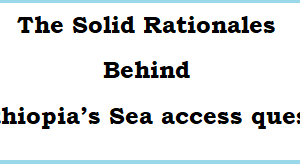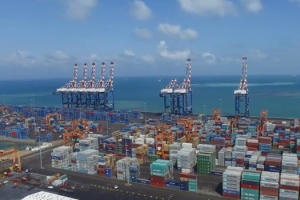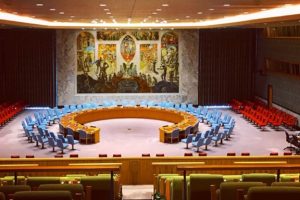BY YOHANES JEMANEH
The government of Ethiopia has been endeavoring to ensure peace and provide unhindered humanitarian support to the Tigray region. Following the declaration of the humanitarian truce, the government has been facilitating humanitarian assistance in cooperation with various international organizations and development partners.
Deputy Prime Minister and Foreign Minister, Demeke Mekonnen recently said that he personally witnessed about 200 humanitarian convoys entering Tigray. The federal government has put relentless efforts to deliver humanitarian assistance to Tigray and has reached five million people in the endeavor. So far, 3,297 trucks with humanitarian aid such as food, medicines, and non-food items went to Tigray.
In his discussion with European Union Commissioner for Crisis Management Janez Lenarčič lately, Demeke mentioned that the delivery of aid to the Tigray region has reached a milestone beyond the UN’s stated goal of 500 trucks per week. Demeke called on partners to expedite support to affected people in the Amhara and Afar regions too.
Various international organizations and development partners are appreciating the enhancement of aid transportation to Tigray. The EU Commissioner also commended the government’s efforts on the further calling on measures to increase access to humanitarian partners for additional fuel, cash, and another route to deliver aid to the region.
Humanitarian partners should work closely according to the guidelines set out by the National Disaster Risk Management Commission of Ethiopia on accessing additional fuel and finance. Access to another route for humanitarian supply to the Tigray region would have never been an issue had the TPLF desisted from its provocative actions against the people bordering the Tigray region who need humanitarian support too, Demeke said.
According to Demeke, the government is also playing its due role to achieve lasting peace and rehabilitation works by supporting and responding to the peace process led by the African Union under the representation of Olusegun Obasanjo.
For EU Crisis Management Commissioner Janez Lenarčič, Ethiopia’s peace efforts are appreciable. He also understood the concerns of the Foreign Minister over the dubious stance of the TPLF on the AU-led peace initiatives. He showed the commitment of his Commission to support the peace process.
Although the government tried its best to reach peace, it hasn’t become effective since the effort didn’t receive reciprocation from the terrorist TPLF’s side. In relation to this, the National Disaster Risk Management Commission recently announced that the Terrorist group has hijacked 1,128 of the 3,297 aid trucks that entered the state. This is not only the concern of the government but also international observers.
Director of the Balsillie School of Int’l Affairs, Prof Ann Fitz-Gerald believed that though the government of Ethiopia has issued measures and assurances, the TPLF has not reciprocated in the same way which could be translated as intent to prolong the conflict.
TPLF has to formally declare an indefinite humanitarian ceasefire, not just declare it but show that it is implementing. That would also require them to stop every aspect of the ongoing forced recruitment process, she said.
Ethiopia is still being threatened with sanctions, AGOA suspension, and cessation but for some very odd reason, not the TPLF which at the end of the day was the actor that started, expanded, and prolonged the conflict.
So the border incursions in a couple of places like Wag Hemra Zone and Afar region, and other border areas including with the Eritrean border has got to stop, Prof Fitz-Gerald said. “TPLF knew insurgency model was extremely well to overthrow the Derg government. It was a model that was further bolstered by internet communications and that is what we are seeing playing out now.”
The people in general in Ethiopia want peace and there are those in the TPLF who are not under criminal investigation who could come to a peace talk table and engage in meaningful dialogue and exchanges, she said.
“But the TPLF is likely to dig its heels in to be represented at a table and its preferred term has been negotiation,” she said. It is remembered that TPLF has put preconditions for the peace deal with the federal government of which the possession of Wolkait is one of them. In this area, the terrorist group had caused a severe humanitarian catastrophe in the Amhara and Afar regions under the camouflage of the Tigray conflict. In Afar Region only, Demeke said, over one million people have been displaced following the invasion of the terrorist group.
Therefore, the government is conducting a strict inspection of border areas to avert the possible transfer of weapons that enable the terrorist group to wage additional war. For Demeke there is a need to be vigilant to prevent the transfer of materials that could be used by the terrorist group for its destructive mission alongside ensuring a smooth flow of humanitarian supplies.
The screening works have revealed that there were attempts to smuggle more fuel and some unauthorized items that could be used to carry out terroristic activities. The government would consult about this with the relevant humanitarian organizations as such activities violate humanitarian supply laws. The Deputy Premier also called on Customs Authority to intensify its monitoring and control of unauthorized items.
On the other hand, the federal government has traveled extra mile to end the conflict with the TPLF peacefully, mentioning the release of political prisoners from detention, the establishment of the National Dialogue Commission, and support given to the peace initiatives of the AU, as to Demeke.
In fact, this endeavor is receiving a warming appreciation from various countries and organizations. After discussing current affairs with Demeke, German Foreign Minister Annalena Baerbock expressed that her government appreciates and supports the peace-building, rehabilitation, and reconstruction efforts of the federal government.
Similarly, the World Food Program Executive Director David Beasley and Sweden’s Minister of International Development Cooperation Matilda Ernkrans applauded the government’s commitments to ensure unfettered humanitarian supply. He said that the peace and stability of Ethiopia is the peace and stability of the region.
The African Union Commission Chairperson, Moussa Faki Mahamat is also among the individuals who welcomed the peace initiatives and the improvement of humanitarian supply. On 16 June 2022, the Chairperson and AU High Representative for the Horn of Africa Olusegun Obasanjo exchanged ideas on the ongoing peace process between the federal government and TPLF.
The Chairperson commends the government and the TPLF for the steps taken toward a peaceful resolution of the conflict and encourages them to continue on the path of political dialogue, in the spirit of the Communiqué of the 1045th meeting of the AU Peace and Security Council. He called on the international community to continue supporting the people of Ethiopia and the ongoing AU-led peace process.
However, for Demeke, inviting terrorist TPLF for negotiation is not enough adding that the group should be told to refrain from its provocative actions and be committed to the peace process with appropriate reciprocal actions.
The same is true for the National Security Advisor to the Prime Minister. Ambassador Redwan Husein stated that the federal government is putting maximum effort to ensure lasting peace and unhindered humanitarian support though TPLF is still putting hurdles. As to him, TPLF denied humanitarian air cargo from entering Mekele. “Such actions show the group’s ill intentions to use the humanitarian problems of the people for its political gain,” he said.
Therefore, Redwan underlined that the international community ought to condemn the acts of the TPLF and force it to engage in peaceful negotiation for the wellbeing of the people.
The Ethiopian Herald June 26/2022





